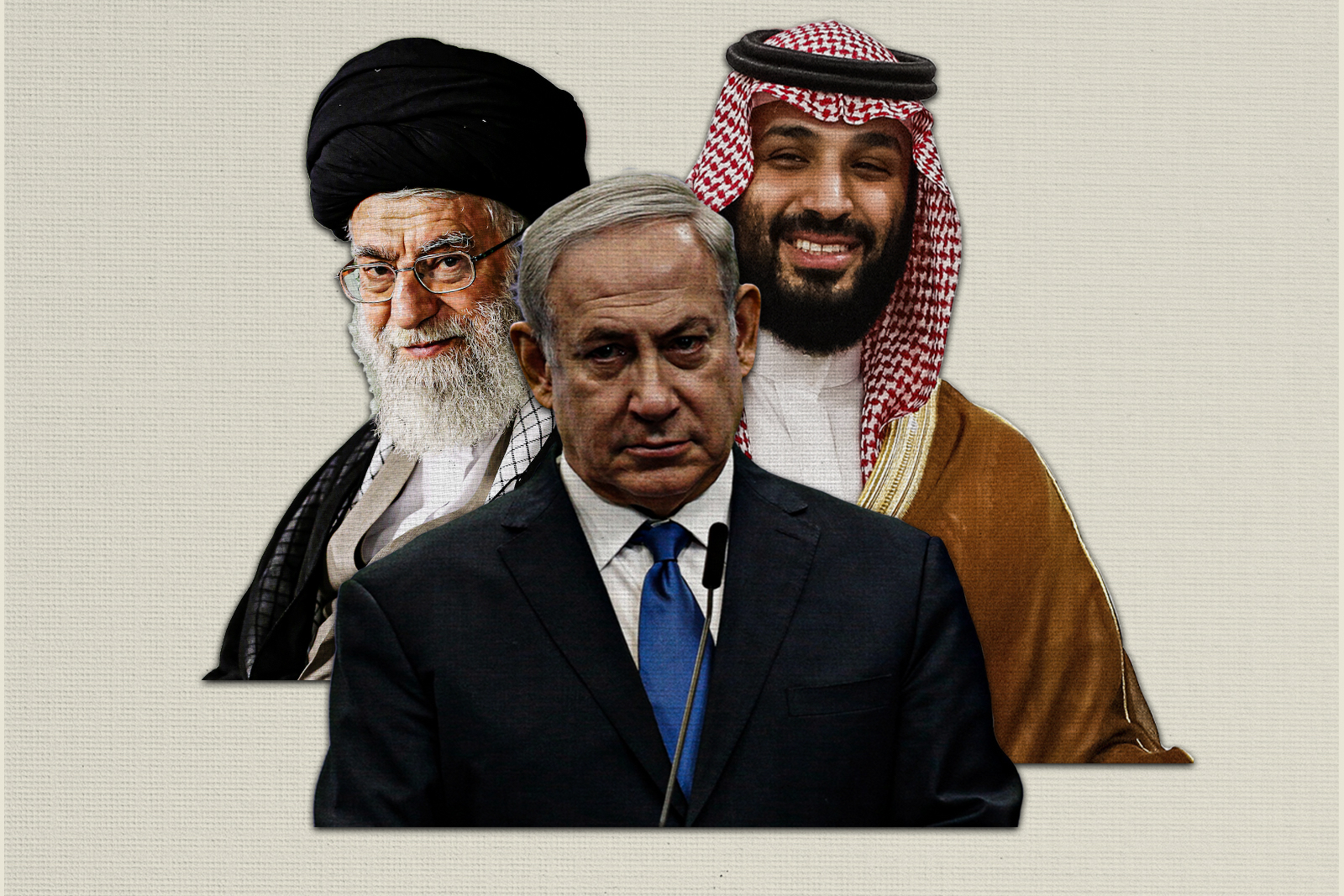
Nuclear Proliferation Could Be Pathway to Peace in the Middle East
As I traverse the Middle East, meeting with state actors and other key players, there is a definite sense that peace and prosperity have rarely felt this far away. The events on October 7th and the ensuing war in Gaza have pressurised the entire region, straining the fragile relations between competing nations.
However, we should never give up on peace. Whilst obviously challenging, the breakdown of so many bilateral relations could give way to opportunity. Opportunity for a radical rethinking of Middle East relations to think imaginatively about creating a system that can deliver peace and prosperity for the region.
I have long believed in the potential to create a transactional framework based around the four main powers in the region: in the north, Turkey; in the West, Israel; in the South, Saudi Arabia; and Iran in the East. Collectively, they form the four points of the compass and can provide leadership for the region.
My belief has always been that if the U.S. and the wider Western alliance cannot find the political bandwidth to make the region a strategic priority, then these four states hold the key to a successful transition of power. In the shadow of Russian and Chinese game-playing in the region, it is vital that the U.S. step in to create this pathway to peace to prevent it from descending into authoritarian spheres of influence.
Up until the events of October 7th, the growing bilateral and transactional relations between these nations demonstrated that this theory was far from a pipe dream. Despite many of these points of the compass remaining on good terms, one key stumbling block to the establishment of this power framework is the relationships Israel has with Saudi Arabia and Iran.
There are three main obstacles preventing a deal between them: security guarantees, nuclear know-how, and the Palestine issue.
Whilst the issues may seem irretractable, counterintuitively the solution to strengthening relations between these two nations and wider peace could be nuclear proliferation.
Nuclear proliferation as a tool for peace
Currently, Israel is the only nation with nuclear weapons in the Middle East, but that isn’t for the want of trying from others. Both Saudi Arabia and Iran have made multiple attempts to break into the ‘nuclear club.’ So far, unsuccessfully. In a compromise, Saudi Arabia have in the past advocated for nuclear disarmament in the Middle East. For this to happen though, Israel would have to give up its nuclear arsenal. Whilst well-intentioned, this is unrealistic; it will never happen.
Meanwhile, the U.S. and the wider Western world have been all too happy for their main ally, Israel to maintain their nuclear hegemony in the region. This was clearly demonstrated with the strained Joint Comprehensive Plan of Action (JCPOA), first signed in 2015, designed to prevent Iran’s nuclear ambitions.
But if this policy was reversed and instead Saudi Arabia and Iran were allowed to join the nuclear club – however grudgingly – it could set the scene for a viable power-sharing framework.
Starting with Saudi Arabia; the largest stumbling block between normalising relations with Israel is the lack of security guarantees. Back in March 2022 when an ARAMCO energy facility was targeted by Houthi rebels, the Saudis were frustrated that the U.S. refused to support their defence. If the U.S. is unwilling to support directly in the region, then it must empower Saudi Arabia to feel secure in its own right.
A nuclear Saudi Arabia would lead to a greater balance of power in the region. Look at relations between India and Pakistan; despite the tensions between these competing nations, their mutually assured nuclear destruction forces them to show self-restraint and ultimately keep the peace, however strained it might be.
But it would be untenable and hypocritical to allow Saudi Arabia to develop their nuclear ambition if Iran were not granted the same right. For many, that might seem a red line that cannot be crossed but allowing Iran to join the nuclear club – rather than waiting for them to do it through their own efforts – would be an opportunity to win long-desired concessions.
Iran would have to agree to rein in their militias. The Houthis, Hezbollah, and Hamas have been disrupting the region for years and if Iran was to be granted nuclear capability, a key condition must be the curtailing of their proxy forces.
The danger with allowing Iran and Saudi Arabia to gatecrash the nuclear club is that it will lead to opposition from Qatar and UAE, who will also want nuclear capability. It is the responsibility of the five permanent members of the UN Security Council to prevent the Middle East from becoming a playground for nuclear weapons by ensuring those nations feel they have security guarantees without needing to go nuclear.
To help provide those guarantees, nations should fall under a protectorate within the Middle East compass framework. Iran can provide guarantees to Qatar, Saudi Arabia to UAE and Turkey are covered by NATO. It is vital that although Western allies are handing over power, they still provide guarantees that no point of the compass would be allowed to bully others within the region.
Solving the Israel-Gaza conflict
Of course, whilst nuclear proliferation could solve a lot of issues, relations between Israel and the Arab world cannot be repaired without a resolution in the war with Gaza. I believe peace can come through the immediate implementation of the two-state solution, making the admission of Palestine to the United Nations the starting point, not the endpoint.
The usual recommendation is the following six-step sequence of events: (1) ceasefire; (2) release of hostages; (3) humanitarian assistance; (4) reconstruction; (5) peace conference for negotiations between Israel and Palestine; and finally (6) establishment of two states on agreed boundaries. This path is impossible. There is a perpetual deadlock on steps 5 and 6, and this sequence has failed for 57 years since the 1967 war.
The correct approach is therefore the opposite, starting with the establishment of two states on globally agreed boundaries, notably the boundaries of June 4, 1967, as enshrined in UN Security Council and UN General Assembly resolutions. The UN member states will have to impose the two-state solution, instead of waiting for yet another Palestinian-Israeli failed negotiation.
The Security Council, backed by the UN General Assembly, has the power under the UN Charter to impose the two-state settlement. It can do so as a matter of international law, following decades of relevant resolutions. It can then enforce the solution through a combination of carrots (economic inducements, reconstruction funding, UNSC-backed peacekeepers, disarmament, border security, etc.) and sticks (sanctions for violations by either party).
Two sovereign states, on the boundaries of June 4, 1967, protected initially by UN-backed peacekeepers and other guarantees, will be the starting point for a comprehensive and just peace not only between Israel and Palestine – but also working relations between Israel and Saudi Arabia and Iran.
The timing on this has never felt more critical. President Biden has a chance to pull off a historic foreign policy win before the U.S. election. Conversely, if Donald Trump is elected in November, then all bets are off.
Let us focus on resolving the Palestinian issue, but then follow up with the creation of the power-sharing framework between the four points on the compass: Iran, Saudia Arabia, Turkey, and Israel.
It is one of the last opportunities for Israel to bring peace and security to its people. Nobody wants to live in constant fear of bombs. If the violence and unrest continue there will be a brain drain and foreign investment will dry up, prolonging the agony of the region. Now is the time to act and reimagine a peaceful Middle East.
